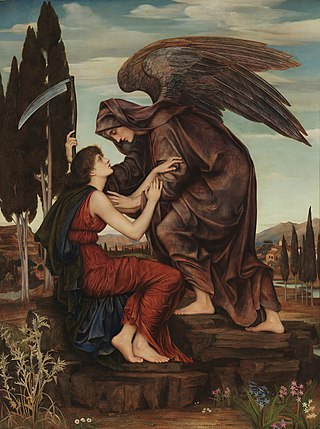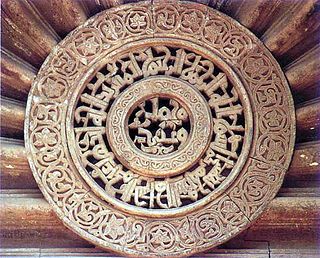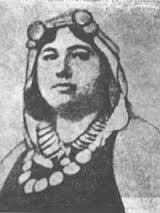Abdul Hussayn Jivaji (also known as Maulana Malak [1] ) was the founder of the Atba-i-Malak branch of Mustaali Ismaili Shi'a Islam. [2]
| |
| Part of a series on Islam Isma'ilism |
|---|
 |
Abdul Hussayn Jivaji (also known as Maulana Malak [1] ) was the founder of the Atba-i-Malak branch of Mustaali Ismaili Shi'a Islam. [2]

Azrael is the angel of death in some Abrahamic religions, namely Islam, Christian popular culture, and some traditions of Judaism.
Mal'ak may refer to:

Tawûsî Melek, also spelled Melekê Tawûs and Tawûsê Melek, translated in English as Peacock Angel, is one of the central figures of the Yazidi religion. In Yazidi creation stories, before the creation of this world, God created seven Divine Beings, of whom Tawûsî Melek was appointed as the leader. God assigned all of the world's affairs to these seven Divine Beings, also often referred to as the Seven Angels or heft sirr.

The Musta‘lī are a branch of Isma'ilism named for their acceptance of al-Musta'li as the legitimate nineteenth Fatimid caliph and legitimate successor to his father, al-Mustansir Billah. In contrast, the Nizari—the other living branch of Ismailism, presently led by Aga Khan IV—believe the nineteenth caliph was al-Musta'li's elder brother, Nizar. Isma'ilism is a branch of Shia Islam.

The term Da'i al-Mutlaq literally meaning 'the absolute, or unrestricted, missionary', is the most senior spiritual rank and office in Tayyibi Isma'ilism. The Da'i al-Mutlaq has headed the Tayyibi community since the seclusion of the 21st Tayyibi Imam, at-Tayyib Abu'l-Qasim, traditionally placed in 528 AH/1134 AD.

Qais Abdur Rashīd or Qais Abdul Rasheed is said to be, in post-Islamic lore, the legendary founding father of the Pashtuns. It is believed that the conception of such a figure was promoted to bring harmony between religious and ethnic identities post-Arabic influence over the region. Qais Abdur Rashid is said to have traveled to Mecca and Medina in Arabia during the early days of Islam and converted. But contrary to this legend, Islam spread through Afghanistan over a period of time.

Tayyibi Isma'ilism is the only surviving sect of the Musta'li branch of Isma'ilism, the other being the extinct Hafizi branch. Followers of Tayyibi Isma'ilism are found in various Bohra communities: Dawoodi, Sulaymani, and Alavi.

The Sulaymani branch of Tayyibi Isma'ilism is an Islamic community, of which around 70,000 members reside in Yemen, while a few thousand Sulaymani Bohras can be found in India. The Sulaymanis are sometimes headed by a Da'i al-Mutlaq from the Makrami family.

Progressive Dawoodi Bohra also known as Bohra Youth is a reform movement within the Dawoodi Bohra subsect of Mustaali Ismai'li Shi'a Islam. They disagree with mainstream Dawoodi Bohra, as led by the incumbent Da'i al-Mutlaq, on doctrinal, economic, and social issues and broke off c. 1977.
Malak-Malak, also known as Ngolak-Wonga (Nguluwongga), is an Australian Aboriginal language spoken by the Mulluk-Mulluk people. Malakmalak is nearly extinct, with children growing up speaking Kriol or English instead. The language is spoken in the Daly River area around Woolianna and Nauiyu. The Kuwema or Tyaraity (Tyeraty) variety is distinct.

In Islamic belief, Maalik denotes an angel in Hell/Purgatory who administrates the Hellfire, assisted by 19 mysterious guards known as Zabaniyya. In the Qur'an, Maalik is mentioned in Sura 43:77 as the chief of angels of hell. The earliest codices offer various alternative spellings of this word including malak, meaning "angel", instead of a proper name.
Masha Mansoor is a town and a union council in the Lakki Marwat District of Khyber-Pakhtunkhwa. Masha and Mansoor are two separate villages. Masha belongs to Malak Masha .Salman Aafie
Beka is a town and Union Council of Swabi District in the Khyber Pakhtunkhwa of Pakistan. It is part of Lahor Tehsil.

The Atba-e-Malak community are a branch of Musta'ali Isma'ili Shi'a Islam that broke off from the mainstream Dawoodi Bohra after the death of the 46th Da'i al-Mutlaq, under the leadership of Moulana Abdul Hussain Jivaji Saheb in 1890. They are based in Nagpur in India. There are several hundred followers of this branch of Musta'ali Isma'ili Shi'a Islam. They have further split into two more branches:

The Atba-i-Malak Badar are a branch of Atba-i-Malak Mustaali Ismaili Shi'a Islam. They follow the preachings of both Abdul Hussain Jivaji and Badruddin Ghulam Hussain Miya Khan Saheb. The current leader or Dai al Mutlaq is Maulana Amiruddin Malak Saheb. The Atba-i-Malak Badar community is based in Mahdibagh, Nagpur in India. The Mahdibagh Atba-i-Malak Badar community, is a unique community of peaceful and progressive Muslims, an elitist sect, known as Atba-e-Malak Badar named after Maulana Malak Saheb, who founded it in 1891 AD in Nagpur, India. The community, with around 250 members in Nagpur, also has its presence in Ujjain, Vishakhapatnam and Hyderabad with a few families settled in these cities.

The Hebtiahs Bohra are a branch of Mustaali Ismaili Shi'a Islam that broke off from the mainstream Dawoodi Bohra after the death of the 39th Da'i al-Mutlaq in 1754. They are mostly concentrated in Ujjain in India with a few families who are Hebtiah Bohra.
Kandjerramalh (Kenderramalh), also known as Pungupungu or Kuwema (Kuwama), is an Australian Aboriginal language from the Northern Territory in Australia. Apart from being closely related to Wadjiginy, it is not known to be related to any other language.
Molkuh is a village in Narestan Rural District, Aqda District, Ardakan County, Yazd Province, Iran. At the 2006 census, its population was 69, in 30 families.

Malak Hifni Nasif was an Egyptian feminist who contributed greatly to the intellectual and political discourse on the advancement of Egyptian women in the early 20th century.
The Wagaydyic languages are a pair of closely related but otherwise unclassified Australian Aboriginal languages: the moribund Wadjiginy and the extinct Kandjerramalh (Pungupungu).